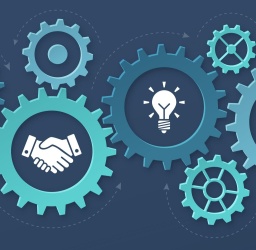Building Resilience in the Modern Workplace

Building resilience in the modern workplace is more critical now than ever before. As organisations and their employees face unprecedented challenges ranging from rapid technological changes, global pandemics, to economic uncertainties, the ability to adapt, recover, and thrive through adversity has become a cornerstone for sustained success and well-being. Resilience in the workplace is about fostering a culture and environment that supports adaptability, learning, and mental toughness among employees and leaders alike. There are perhaps six key areas in which resilience can, and indeed must be shown. Here, these six elements are considered, both in terms of their importance and also what their absence will result in.
Leadership and Culture stand at the core of building resilience in the modern workplace, serving as the cornerstone for how an organisation navigates through uncertainty and change. Effective leaders inspire resilience by modelling adaptability, empathy and clear communication, setting a tone that encourages a culture of resilience throughout the organisation. They foster an environment where challenges are viewed as opportunities for growth, innovation is embraced, and failure is seen as a step towards learning and development. Developing this culture requires intentional actions, such as recognising and celebrating resilience in action, providing training that emphasises emotional intelligence and adaptability, and creating open lines of communication that encourage feedback and dialogue.
When leadership and culture lack a resilience-focused approach, organisations may find themselves ill-prepared for adversity. The absence of a resilient culture can lead to a workforce that is resistant to change, low in morale, and lacking in cohesion, significantly hampering the organisation’s ability to bounce back from setbacks.
EXPLORE ALL TRAINING OPPORTUNITIES BY EIMF
Employee Well-being and Support are fundamental to building resilience in the modern workplace. This element recognises that the health and mental well-being of employees are crucial for sustaining productivity, creativity and the ability to withstand and adapt to change. Well-being initiatives can be developed through comprehensive health programs, access to mental health resources, flexible work schedules, and fostering a supportive work environment that encourages open discussions about stress and workload management.
Without a strong emphasis on employee well-being, organisations may face increased absenteeism, high turnover rates and decreased productivity. A lack of support can lead to burnout, disengagement and a workforce ill-equipped to navigate challenges, undermining the organisation’s resilience and capacity to recover from setbacks.
Adaptability and Flexibility are essential elements in fostering resilience within the modern workplace, enabling organisations and their employees to navigate the rapidly changing business landscape. These qualities ensure that businesses can respond swiftly to market shifts, technological advancements and unforeseen challenges, turning potential threats into opportunities for growth. Developing adaptability and flexibility involves cultivating a culture that values continuous learning, encourages experimentation, and supports individuals in stepping out of their comfort zones. This can be achieved through diverse project assignments, cross-functional team collaborations, and promoting a mindset of growth and innovation.
When adaptability and flexibility are lacking, organisations risk becoming stagnant, unable to pivot in response to new information or emerging trends. This rigidity can lead to missed opportunities, decreased competitiveness, and a workforce that is resistant to change, ultimately impairing the organisation’s resilience and capacity to thrive in the face of adversity.
EXPLORE ALL TRAINING OPPORTUNITIES BY EIMF
Continuous Learning and Development is vital for building resilience in the modern workplace as it equips employees with the skills and knowledge necessary to adapt to evolving industry standards, technologies and work practices. This proactive approach to learning fosters an environment of innovation, where employees are encouraged to explore new ideas, challenge the status quo, and develop solutions to unforeseen problems. Organisations can cultivate continuous learning by offering access to training programs, workshops, mentorship opportunities and supporting further education.
When continuous learning and development are absent, organisations risk becoming obsolete. Skills gaps can widen, and employees may feel undervalued and disengaged, leading to a decrease in innovation and productivity. This stagnation not only affects the company’s ability to compete but also diminishes its resilience, making it harder to bounce back from setbacks and adapt to change.
Communication and Collaboration are pivotal for fostering resilience in the modern workplace, as they enable the flow of information, ideas and support across all levels of an organisation. Effective communication ensures that employees are aligned with organisational goals and aware of changes, while collaboration encourages the pooling of diverse skills and perspectives to tackle challenges more creatively and effectively. Developing these elements involves creating open channels for feedback, implementing collaborative tools and platforms, and promoting team-based projects that require cross-functional cooperation.
When communication and collaboration are lacking, organisations may face silos that hinder the flow of information and reduce efficiency. This fragmentation can lead to misunderstandings, reduced morale and missed opportunities for innovation, significantly weakening the organisation’s resilience. In the absence of a collaborative culture, teams struggle to adapt to change and recover from setbacks collectively.
Risk Management and Planning are essential for building resilience in the modern workplace, as they prepare organisations to face potential challenges proactively. This element involves identifying potential risks, assessing their impact, and developing strategies to mitigate or respond to them effectively. By having a comprehensive risk management plan, organisations can minimise disruptions, ensure continuity of operations, and adapt more quickly to unforeseen events. Developing robust risk management and planning can be achieved through regular risk assessments, scenario planning exercises, and establishing a culture of preparedness that encourages proactive thinking and readiness for change.
Without effective risk management and planning, organisations may find themselves vulnerable to unexpected challenges, leading to potential financial losses, operational disruptions, and damage to reputation. The absence of this critical element compromises the organisation’s ability to respond effectively to adversity, thereby weakening its overall resilience.
EXPLORE ALL TRAINING OPPORTUNITIES BY EIMF
The journey to cultivate resilience
In conclusion, the journey to cultivating resilience in the modern workplace demands a holistic approach, emphasising the interconnectedness of leadership, culture, employee well-being, adaptability, continuous learning, communication, collaboration, and effective risk management. By dedicating resources and effort to these critical areas, companies lay the foundation for a resilient structural fabric that can absorb shocks, rebound from challenges, and seize opportunities for development. This comprehensive strategy ensures that resilience becomes an ingrained aspect of the corporate ethos, empowering employees at all levels to contribute to a dynamic, adaptive, and robust workplace. As the business landscape continues to evolve at an unprecedented pace, the ability of organisations to remain resilient will not just be an advantage but a necessity for survival and prosperity. Embracing resilience as a core value positions businesses at the forefront of innovation, ready to navigate the complexities and uncertainties of the future with confidence and strategic foresight.
Related Training Programmes
27/05/2024 - Advanced Negotiations Skills
28/05/2024 - Emotional Intelligence (EQ) – The Missing Link for Professional Success
10/06/2024 - Time Management for Improved Productivity
11/06/2024 - EIMF Certificate in Generative Artificial Intelligence (AI) for Project Management
11/06/2024 - Building Resilience in the Modern Workplace
18/06/2024 - EIMF Certificate in Leadership and Management
19/06/2024 - Leadership on Boards of Directors
02/07/2024 - Embedding Equity, Diversity, and Inclusion (EDI) in Organisational Culture
Share:
Διαβάστε Επίσης
Η κριτική σκέψη δεν είναι απλώς μια εγκεφαλική διαδικασία.
Η εταιρική διακυβέρνηση δεν αφορά μόνο διοικητικά συμβούλια και κανόνες
 Ελληνικά
Ελληνικά  English
English


